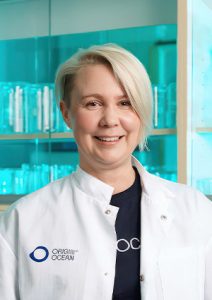Mari Granström on turning ocean overgrowth into blue economy value for a bio-based future
Around the world, communities are grappling with a challenge impossible to ignore – invasive algal blooms. Fueled by nutrient run-off and climate change, brown algae such as sargassum proliferates in vast quantities. In the Caribbean alone, cleanup costs run into hundreds of millions of dollars each year, while ecosystems, fisheries, and tourism economies are thrown into disarray.
This problem is not local. Algal blooms are now spreading into new areas, from West Africa to Northern Europe. What used to be a rare issue in stable marine ecosystems has become a clear sign of how climate change and human activity on land are disrupting both nature and local economies.

Rethinking value chains
For industries dependent on raw materials, these blooms present an unusual paradox. On one hand, companies in cosmetics, food, personal care, and pharmaceuticals are under increasing pressure to replace fossil-derived and petrochemical ingredients. Regulatory frameworks and shifting consumer demand for cleaner, sustainable products are accelerating this transition. On the other hand, an abundant, even overwhelming, biomass resource is available, largely untapped.
The central question becomes: can harmful algae be transformed from an environmental disaster into a source of industrial innovation?
The first algae refinery
In Finland, a new initiative aims to answer this very question. Origin by Ocean, a Finnish green chemicals company, has entered a strategic partnership with the CABB Group, a global contract development and manufacturing organization specializing in fine chemicals. Together, they are preparing to build a first-of-a-kind (FOAK) algae biorefinery at CABB’s production site in Kokkola, Finland.
Set to begin operating in 2028, the facility will process sargassum into high-value ingredients alginate and fucoidan, while also valorizing biomass residues as cattle feed or growing media. Origin by Ocean will design and build the plant using its patented biorefinery technology, while CABB will operate it under a Manufacturing-as-a-Service arrangement. This collaboration combines CABB’s expertise in scaling and operating complex chemical processes with Origin by Ocean’s novel feedstock and technology.
Innovation meets industrial scale
Kokkola Industrial Park (KIP) is Northern Europe’s largest ecosystem of inorganic chemical industry. Locating the biorefinery there provides access to established infrastructure, logistics, and chemical processing know-how – assets that reduce both capital intensity and operational risk for a pioneering facility. The partnership model also helps address one of the key barriers in scaling new bio-based technologies: the so-called ‘valley of death’ between pilot and commercial scale.
Technology and ingredients
At the heart of the project is a patented biorefinery process that can fractionate brown algae into multiple product streams.
Alginate – a biopolymer widely used in food, personal care, textiles, and biomedical materials as a thickener, stabilizer, or film former
Fucoidan – a sulfated polysaccharide with reported anti-inflammatory and skin longevity properties, opening opportunities in cosmetics and nutraceuticals
Biomass residue – usable as fertilizer, cattle feed, or other industrial inputs, supporting a zero-waste framework
This multi-product output mirrors the logic of traditional petrochemical refineries but applied to marine biomass. It maximizes resource efficiency while creating diverse revenue streams.
 From regenerative innovation to industrial adoption
From regenerative innovation to industrial adoption
The significance of this initiative extends beyond one plant. When successfully operational, the model can be replicated globally, particularly in regions directly burdened by algae blooms. By locating facilities near affected coasts, invasive biomass could be harvested and valorized locally, creating new value chains while reducing ecological damage.
Scaling from pilot to a commercial biorefinery requires significant capital and patient partnerships. Regulatory approvals for new ingredients, particularly in sensitive sectors such as food and cosmetics, take time. Supply chain logistics, from biomass collection to processing, must also be managed sustainably to ensure long-term viability.
Yet these issues are not unique to algae. They are shared by many next-generation material innovators. The value of the Origin by Ocean and CABB partnership lies in its attempt to de-risk these hurdles by combining novel science with established industrial knowledge.
The future of functional chemistry
This project serves as a case study for how industries might rethink raw materials. By reimagining value chains at their source, companies can simultaneously address environmental externalities and industrial bottlenecks. The model demonstrates that sustainability can be pursued not only through incremental substitutions, but by fundamentally redesigning the chemical industry value chain.
Mari Granström
Mari Granström is the Chief Executive Activist and Founder of Origin by Ocean, a Finnish green chemicals company transforming harmful algae into regenerative, high-value biopolymers. Mari holds a doctorate in organic chemistry and is passionate about aligning science, industry, and ecology to reimagine the future of materials

 From regenerative innovation to industrial adoption
From regenerative innovation to industrial adoption